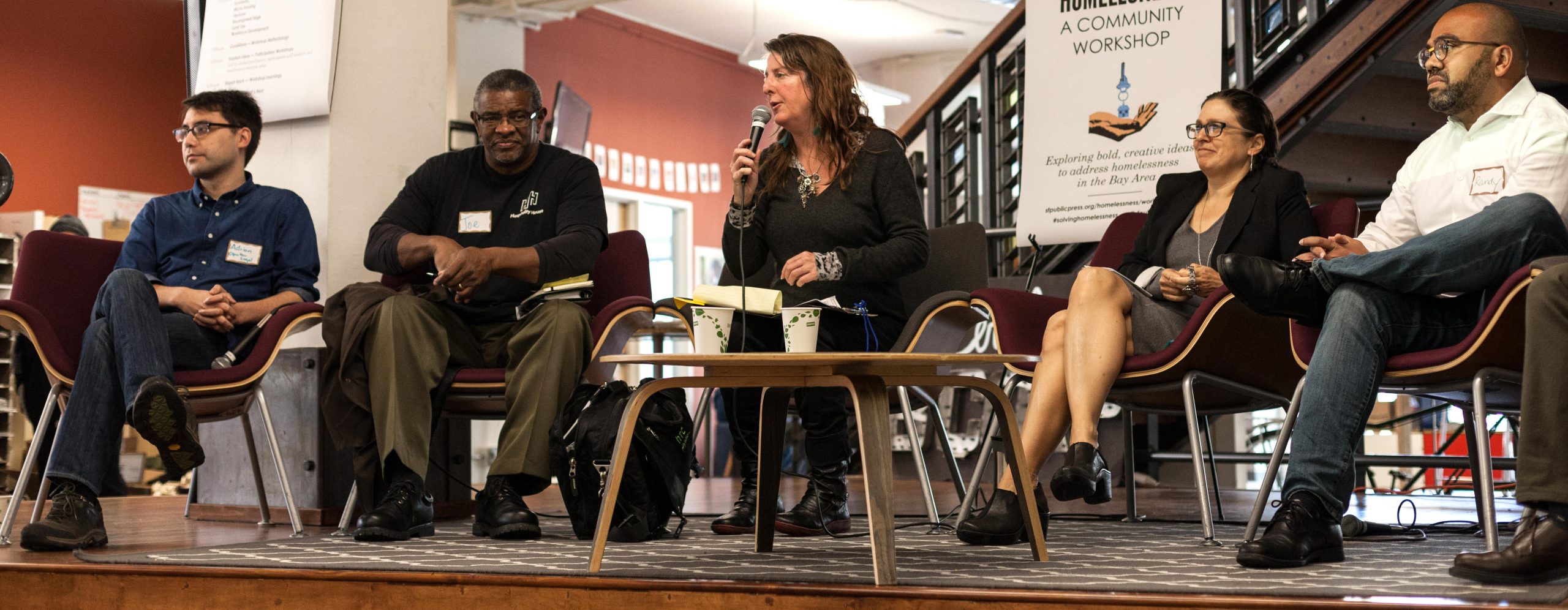
A panel of experts and stakeholders explained the state of the homelessness crisis at our January 2018 event, Solving Homelessness: a Community Workshop, an event that overlapped with our continuing print and online coverage of the issue. Photo by Garrick Wong // San Francisco Public Press/Renaissance Journalism
We honestly didn’t expect the issue of homelessness in San Francisco to find resolution anytime soon. But this fall, with November’s passage of Proposition C — the business tax that could generate as much as $300 million a year for housing and homeless services — we saw the search for solutions jump off the pages of newspapers and into the real world.
Over the last year and a half, the Public Press has returned again and again to investigating broken systems for providing housing and social services. We have explored creative ideas from community members who are bent on solving the ongoing humanitarian crisis on our streets.
Our recent efforts started in summer 2017, when we reported that lack of capacity was straining the city’s “navigation center” shelter model, which aimed to break down tent encampments and move people into permanent homes.
Then that fall, we published a package of stories exploring solutions to homelessness, in the run-up to a day-long conference in January where we gave the stage to community leaders proposing ideas for opening up more housing, improving medical treatment for people living on the streets and reconnecting people with families.
The cover story in our solutions issue revealed data about the shockingly high vacancy rate in single-room occupancy hotels, which our reporters found could — if rented and refurbished by the city — house more than 40 percent of the people sleeping on the streets. This November, that edition of the paper won awards for community reporting and graphic design from the Northern California chapter of the Society of Professional Journalists.
The investigative story, by freelance reporter Joe Eskenazi, was so widely read and influential that its findings were circulated in the June 2018 mayoral election, as candidate Mark Leno made filling those rooms the top plank in his political platform. Two other candidates echoed that idea on the campaign trail.
The problem of homelessness is multifaceted, and so we continued to report on broken systems that receive little public scrutiny over many months. Last spring we examined programs that send homeless families to apartments outside of San Francisco, and found that a lack of follow-up made it unclear whether the program had succeeded at its ambitious rehousing goals.
When we started this reporting, we never had a specific policy agenda to push, other than responding to the feedback of several hundred Public Press members, newsletter subscribers and social media fans who said homelessness and the housing affordability crisis had left them feeling disempowered. More than anything, San Franciscans want to know how they can help.
Proposition C, a grassroots initiative, was controversial to be sure. Mayor London Breed and other prominent politicians opposed it, and they were joined by vociferous tech titans suspicious of wasteful bureaucracy. But after the measure’s success at the ballot box, conversation moved quickly to how the city could get to work making the most effective, accountable use of existing and expanded funding.
The Public Press, as regular readers know, does not do advocacy journalism. We don’t make endorsements, and we don’t tell people how to vote. Yet we are encouraged that a problem that has victimized so many poor and infirm people, and scared and saddened some of those lucky enough to have homes, is finally at the forefront of public policy — and that San Francisco is no longer ignoring its most heartbreaking inequity.
Michael Stoll, Executive Director
Lila LaHood, Publisher










